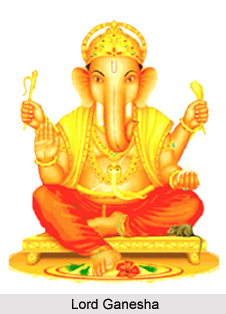 The Mahapuranas and Upapuranas mention that there are eight attendants of Lord Ganesha. The combination of the attendants is Subhadayaka, Gokarna, Suvaktra, Vighnaraja, Saumya, Gajakarna, Balavana and Avighna. They serve as the door keepers for the abode of the Lord. It is also believed that the attendants guard the temples of Lord Ganesha as well. Two of the attendants are installed on each side of the four sides of the gate.
The Mahapuranas and Upapuranas mention that there are eight attendants of Lord Ganesha. The combination of the attendants is Subhadayaka, Gokarna, Suvaktra, Vighnaraja, Saumya, Gajakarna, Balavana and Avighna. They serve as the door keepers for the abode of the Lord. It is also believed that the attendants guard the temples of Lord Ganesha as well. Two of the attendants are installed on each side of the four sides of the gate.
In the Ganesha temples, Siddhi is to be installed on the right, Gajakarna is required to be located on the left, Buddhi installed towards the east, Gauri is placed to the north direction, Saraswati is installed on the south, Dhumraksha is required to be located at the back and Kubera is placed towards the west.
This article is a stub. You may enrich it by adding more information to it. You can send your write-up at content@indianetzone.com




















